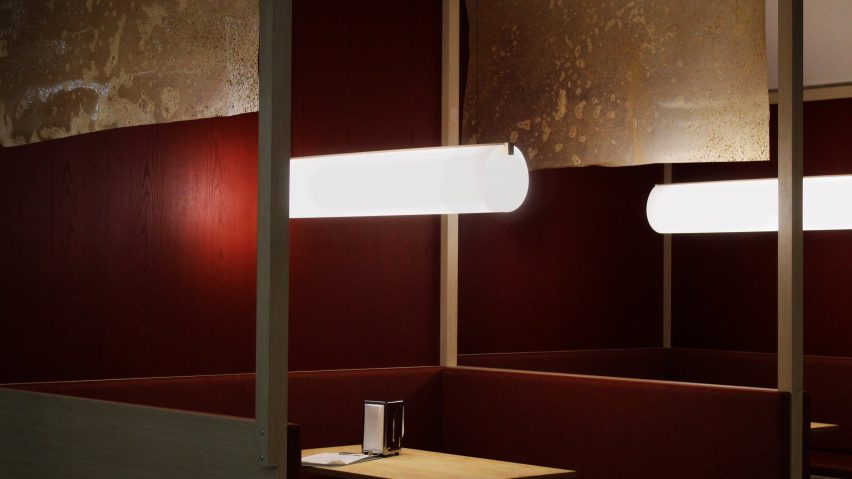Copenhagen-based Natural Material Studio has handcrafted swirly panels made of spent grain salvaged from beer production for a restaurant opened by the local ÅBEN brewery.
Led by designer Bonnie Hvillum, Natural Material Studio created the thick, semi-translucent and semi-rigid rectilinear panels out of surplus beer sourced from the ÅBEN brewery in Copenhagen.
The first step involved processing the 'mask' – the Danish term for small grains leftover from the beer production process.
Initially extracted as a wet pulp, the mask then needed to be dried.
"From the very start of the process, it was important for us not to force the waste material, so we let it dry naturally," explained Hvillum.
"It takes a few days, during which time the grains become lighter in colour – beige, or even a bit golden," she told Dezeen.
Once the grains had dried, the studio ground them into various particle sizes, which was crucial not only for the technical qualities of the final material but also its swirly appearance, according to Hvillum.
"The smaller particles, in powder form, colour the material. The coarser ones create the pattern and give a visual indication of what the material is made with," explained the designer, referring to the neutral-hued, beer bubble-style streaks that characterise the panels.
After treating the dried grains in this way, the team combined them with Procel – a home-compostable, protein-based bioplastic of natural softener and chalk developed by Natural Material Studio.
Hvillum and her team hand-cast the mask and Procel mixture into straight sheets of up to three metres in length, forming the final panels.
"This hand-crafted technique allows you to apply the mask almost like paint, while leaving space for the organic material motions that happen during the casting," acknowledged the designer.
"The balance between our human gestures and the material's own way of flowing is visible in the final sheets," she added.
Hvillum explained that the team had to take great care to ensure that the mask did not ferment during the natural drying process.
"We were dealing with something that had already been processed once in the beer production. We needed to be very careful around the reheating of the mask grains," said the designer. "If the mask fermented again, the panels would have never dried out."
The team also had to slim down the panels, which were originally meant to be five millimetres thick, to ensure that enough excess water could escape the mask while it was being cast.
"For us, it was a game of getting the panels to set as fast as possible without the mask starting to ferment," explained Hvillum.
"By casting thinner sheets we were able to contour the process more and extract the water from the material faster," added the designer.
The beer-based panels have been installed as decorative space dividers at Copenhagen Airport's ÅBEN restaurant and bar, which features interiors designed by local studio Spacon & X.
"We think the panels work well in the space because of their strength and expression, and really materialise the brewery's beers," said Hvillum.
The designer was named as winner of the inaugural Bentley Lighthouse Award at last week's Dezeen Awards for her studio's "uncompromising" work in bio-based material development.
Natural Material Studio's previous projects include reusable biomaterial gift wrap designed for fashion brand Calvin Klein last Christmas and crockery created out of powdered seafood seashells for Danish restaurant Noma.
The photography is by Jonas Pryner and Natural Material Studio.

